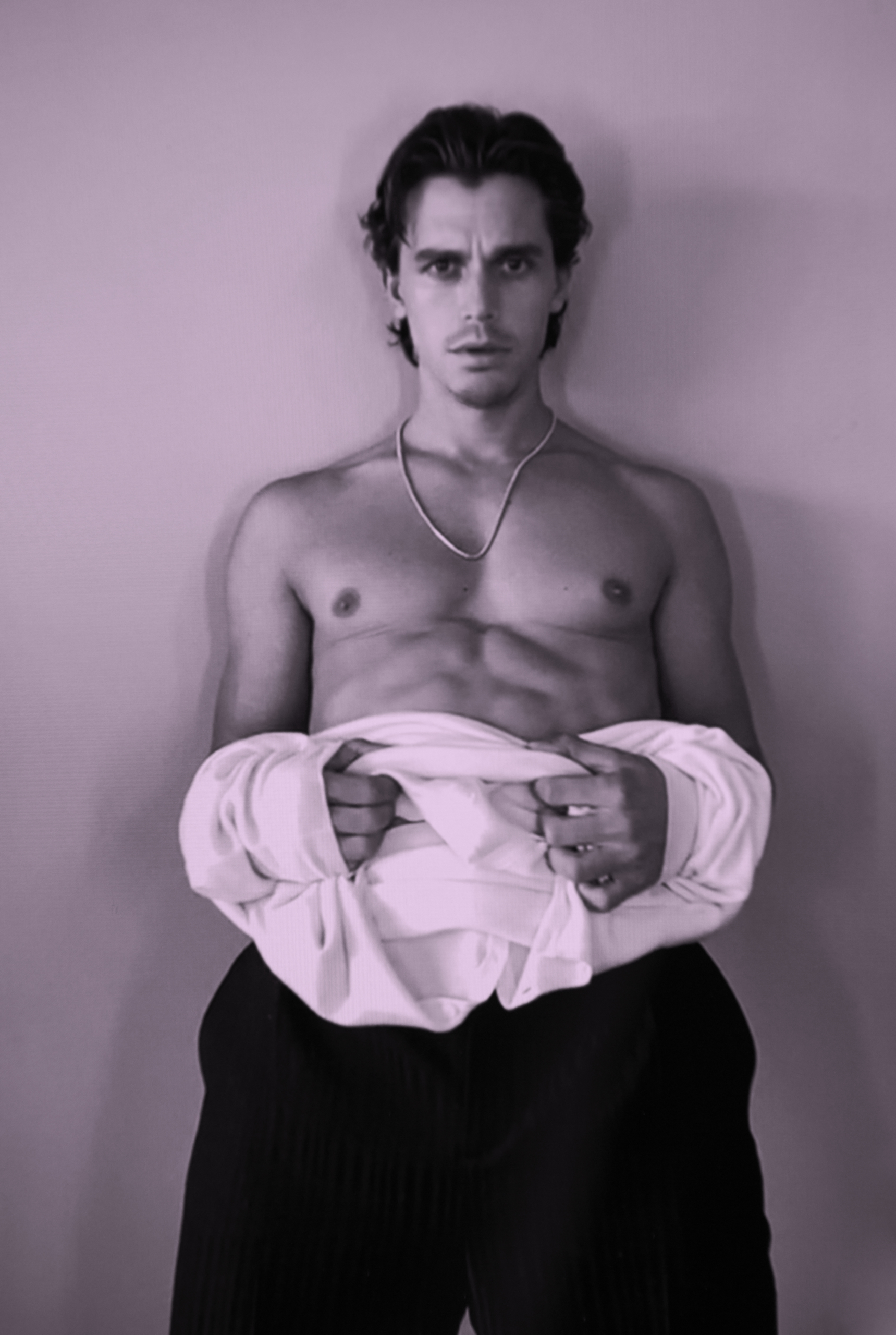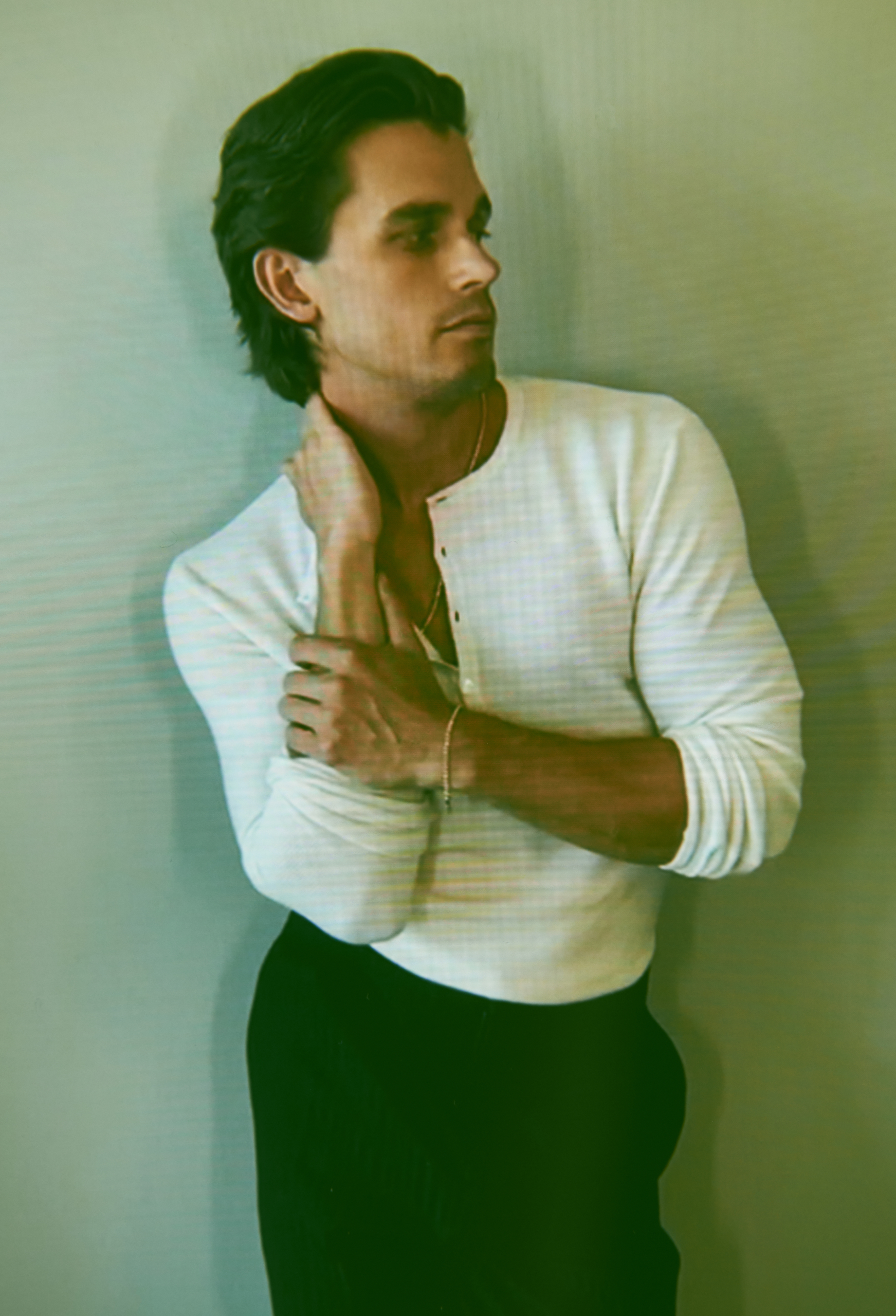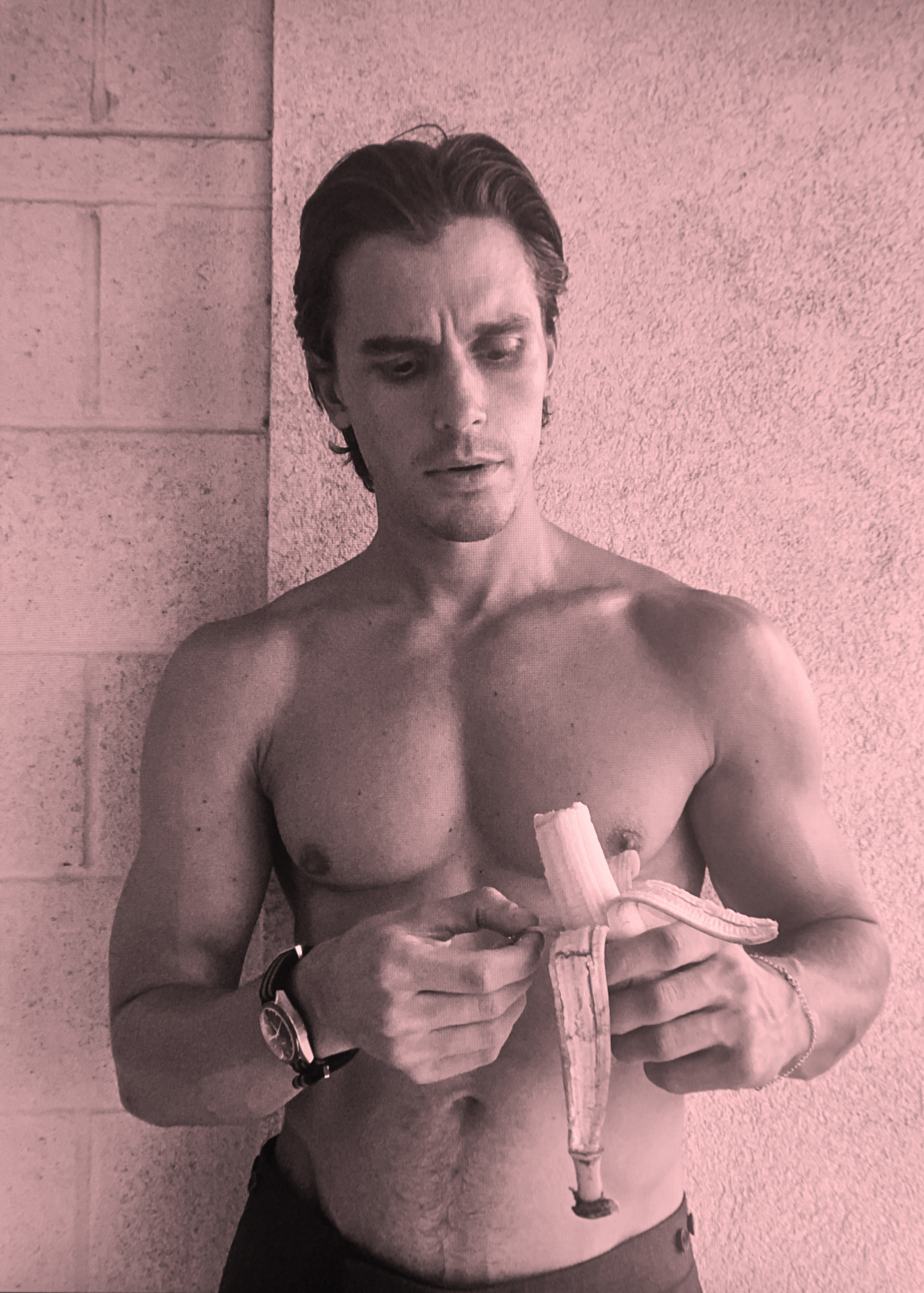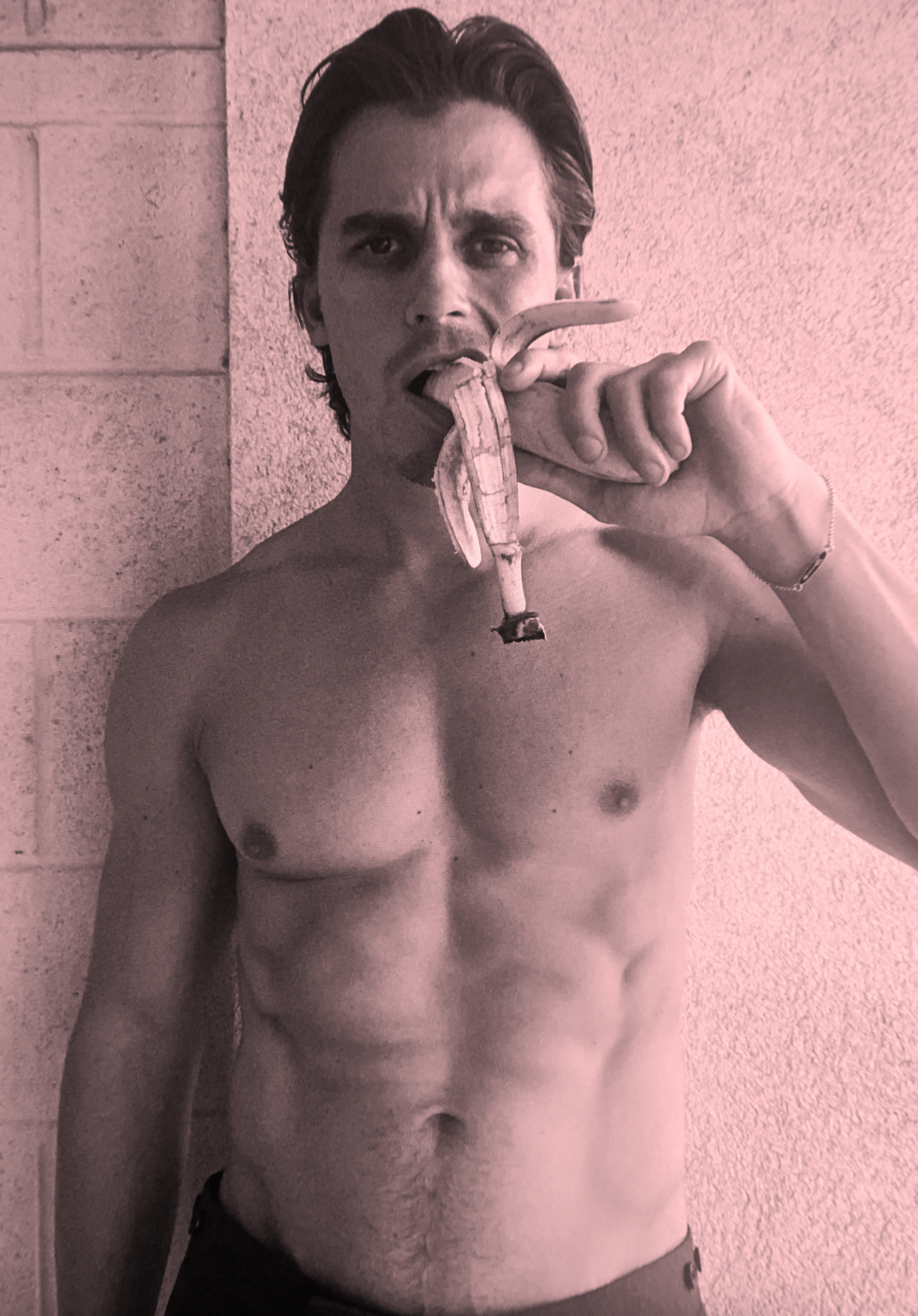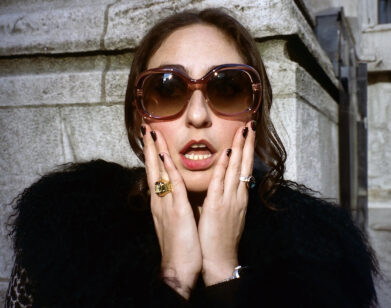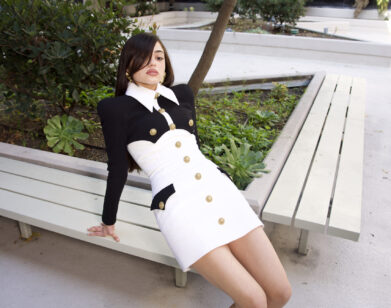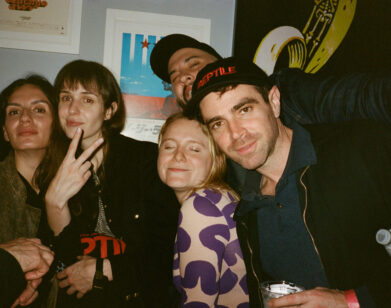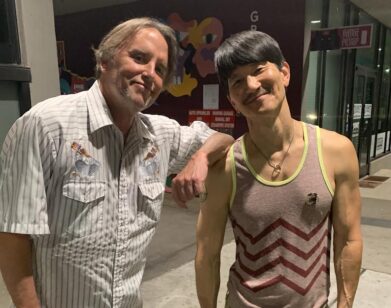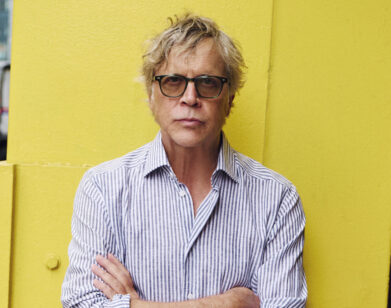“A Rom-Com About Fluidity”: Antoni Porowski Tells Justin Theroux About His Next Move
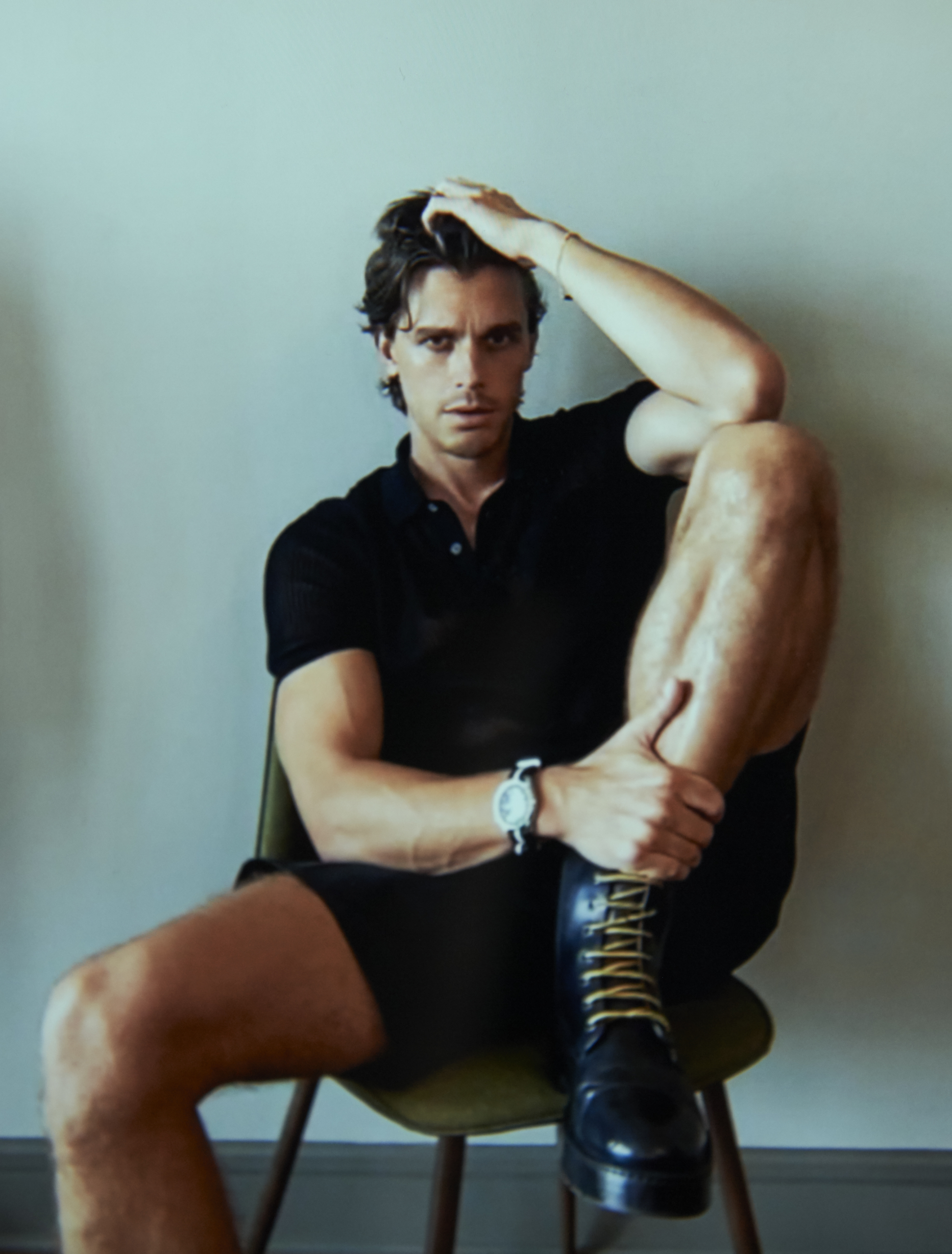
Shirt, Shorts, and Shoes by Salvatore Ferragamo. Watch (worn throughout) by Omega. Bracelet (worn throughout) Antoni’s Own.
Before the coronavirus pandemic hit, Antoni Porowski was everywhere. Since 2018, when he became an instant object of obsession as the dreamy food and beverages guru on Queer Eye, Porowski opened a restaurant (The Village Den, in New York), wrote a cookbook (Antoni in the Kitchen), landed a production deal with Black-ish creator Kenya Barris (more on that later), and worked his way into Taylor Swift’s inner-circle, all while filming five seasons of his hit reality show. The irony of his hectic schedule meant that the man who shot to fame by teaching us how to fancify a pancake barely had time for off-camera cooking. That changed when production on Queer Eye’s sixth season was suddenly put on pause (season five premiered on Netflix last week), leaving the 36-year-old Canadian stranded in Austin, Texas, with his boyfriend, Kevin Harrington, and their dog Neon. The unexpected downtime has given Porowski the chance to sharpen his kitchen skills, embracing the fundamentals while learning new tricks. A few weeks ago, Porowski connected with his friend, the actor and filmmaker Justin Theroux, to share some cooking hacks, discuss Queer Eye’s secret sauce, and talk about what comes next.
———
JUSTIN THEROUX: This is an obvious first question when you’re in quarantine: How do you structure your day?
ANTONI POROWSKI: I’m kind of living the dream of routine, which I haven’t had since Queer Eye came out. The life that I had before Queer Eye was that I’d wake up in the morning, go to work for Ted Allen or at the gallery, go to the gym, make dinner, watch TV, and then go to sleep. But in all of last year, I’ve spent a total of two months in my apartment in New York. And now, I’ve sort of been forced back into a routine, which I really love.
THEROUX: Where are you working out?
POROWSKI: In the apartment. We have two 20-pound kettlebells, two 45-pound weights, 35-pound weights, and resistance bands.
THEROUX: It’s really hard to get workout equipment, but I actually constructed a mini-gym for myself, and I have an outdoor area that I can work out in, which I love.
POROWSKI: That we don’t have here. But we go running. When it’s peak heat, these running trails are super empty, and we just get a few miles in. The goal is to get 15 miles a week.
THEROUX: I’ve found cooking and the intention of cooking has completely changed since I’ve been in quarantine. It’s weirdly more enjoyable, because I’m not cooking with the idea that I’ve got to slap together some eggs or a to-go smoothie so that I can get to the gym. It’s been a lesson in staying in the present. The tomato needs to be chopped, then the garlic needs to be chopped. It’s a very zen exercise. I’m eating at sometimes 10 p.m. or 10:30 p.m., because I’m just not concerned with having to get dinner on the table.
POROWSKI: I’m still extremely vain and I try to do intermittent fasting, so we try to eat by 7 p.m., but now I have a bad habit of a Halo Top container every single night.
THEROUX: I’m doing Tofutti Cuties, which is not very cutie.
POROWSKI: As much as I preach preparing a meal for yourself, that’s not something that I’ve been able to do because I’m in hotels or apartments, and when I’m filming for 10 hours, the last thing I want to do is prepare a whole meal just for myself at the end of the day.
THEROUX: I get a chicken, and that’s three meals: it’s chicken, then it’s the chicken soup, then it’s the chicken sandwiches.
POROWSKI: Oh, totally. It’s weirdly like when I first moved to New York and was broke off my ass begging my dad for $100 here and there just to get by, and having to be smart about food.
THEROUX: Are you the kind of cook who’s better when he’s cooking for other people rather than himself?
POROWSKI: Totally. I’m cooking for two now, and then for Neon, as well. I love cooking for the dog.
THEROUX: I do, too. I’ve been getting so much hate from people being like, “You’re killing your dog.” I’m like, “What are you talking about? Dogs’ stomachs are impossible to destroy for the most part. They can eat a rock and pass it within two hours.” I’m not giving her chocolate, and if it’s something that’s too spicy, I’ll rinse it off before I put it on her plate.
POROWSKI: That’s what I do. I don’t want to deal with the repercussions. We had a bad lesson with mango where I read on the internet that dogs love mango skins. We suffered for three days after that, so no more mangoes.
THEROUX: What are three implements that you keep by your stove or your chopping block?
POROWSKI: A rubber spatula, tongs, and a microplane, because I put lemon zest on literally everything. My new thing that I’m obsessed with is marinating chicken in yogurt the way they do in Indian food and a lot of Greek food. It’s delicious. It tenderizes it and it gets this really nice crust when you sear it.
THEROUX: I’ve been tempted to do Indian food, but then I look online and I’m just like, “Oh my god, this is an all-day process, and there are so many spices.” What are you eating when people aren’t watching?
POROWSKI: I made chocolate chip cookies two weeks ago, and had a ton of them on Sunday with ice cream. And then I didn’t touch them for a week. I try to be really good about that.
THEROUX: You’re supposed to do that. It’s called a metabolism spike.
POROWSKI: Yep. I had pancakes this morning with maple syrup that my dad sent me, and then a massive extra pepperoni pizza for dinner, and I literally eat Swedish fish and cookies during the day. I eat whatever the hell I want.
THEROUX: Have you been ordering from any good spots in Austin?
POROWSKI: Yeah, we’ve been ordering takeout from restaurants. But for the most part, we’ve been cooking because I don’t know how long this is going to go on for, and I just love the fact that I’ve been able to think about what I want to eat, prepare something, and then put the time and care into making a meal every night. That’s been the most satisfying thing to come out of this whole situation. There’s something really nostalgic I was mentioning earlier, about going back to what it was like when I was living in Brooklyn and I was eating a shit-ton of peas and canned tuna.
THEROUX: What are you missing most in quarantine?
POROWSKI: I miss the experience of walking into a subway.
THEROUX: Which version of that? The summer version, when you get hit with the wet, hot tongue of the temperature?
POROWSKI: Even though I’m Canadian, I’m a lot more sensitive to the cold. The summer heat doesn’t really bother me. So what if I’m sweaty? I’m like a dog in that respect. I just miss swiping the MetroCard, waiting for the train, listening to music on my headphones.
THEROUX: Walking is the one that I miss more than anything. I don’t know what it’s like in Austin, but in New York, there’s this low-level anxiety that creeps up as you’re starting to put on your gloves and your mask.—even if it’s a beautiful day out. It’s almost as if someone starts a timer when you get out the door, and you’re going to have to be back within 20 minutes.
POROWSKI: It’s like staring into an eclipse or something. Grocery stores are my favorite places to go, but now I’m much more laser-focused. I get in and out. And that sucks, because that’s something that’s otherwise so pleasurable.
THEROUX: What I’m liking about New York right now is that you’re really just seeing your neighbors, and that’s a nice feeling. There are no tourists, no students, no people passing through. Every person you see, you kind of go, “Oh, we’re in this hood together.” And it’s created this kindness that I’m really liking. It becomes local again. I don’t know if you’ve been in Austin long enough to have that experience.
POROWSKI: Everyone here is a lot more conversational than they are in New York. In New York, we get from A to B and get our shit done. People are a little chattier here, especially during these times. They’re a lot more like, “So, how’s your day going? What are you going to do with this chicken?” There’s more kindness in that respect.
THEROUX: That’s what I’m experiencing here. I’ve seen a couple people lose their tempers, which boggles my mind. Why would you be yelling at someone who works at a grocery store when they’re out there every day?
POROWSKI: You should be thanking them when you leave because they just sanitized your freaking cart.
THEROUX: You should be tipping them. What’s going to happen to restaurants? What does that look like?
POROWSKI: I’m an optimist, and in New York, it’s like the punks and cockroaches—they always come back. I really hope there’s some kind of renaissance in terms of all those small businesses. I don’t know how long that’s going to take, but that’s what makes the city special, the little holes in the wall.
THEROUX: New York is like its own organism that’s constantly moving, shifting, expanding, mutating. I remember in the late ’90s, early 2000s, restaurants were doing collaborations with tattoo parlors. There was a lot more collaboration. I wonder if it’s going to go back to that, some version of pooling your resources to make something happen.
POROWSKI: No one knows.
THEROUX: I’ve watched every episode of Queer Eye, and there’s intention behind what you guys do, which is what made me fall in love with this second iteration of the show. There’s kindness baked into the cake of what you do. Is that something that you set out to do or was it developed? Or did you just have the right five ingredients to make the soufflé rise?
POROWSKI: The old Queer Eye was definitely more about humor. It certainly had moments of heart, especially at the end of an episode, but there was a lot more comic relief and poking fun at the way people lived their lives. But those were all New York stories. It was a very different thing. Here, we’re going to all these different sections of the population with different demographics and socioeconomic statuses. We have really amazing casting directors, and I’d like to think that they saw in us a genuine desire to help, to be kind not only to each other but to the people that we’re helping. I think that earnestness is the secret sauce.
THEROUX: I have a question about judgment. It’s almost gospel now: Don’t judge. I try to live that gospel, but when is it okay to judge? Or is it never okay to judge? Like, with certain people in our current administration, I can’t help but judge them.
POROWSKI: I’d be lying if I said that I’m not a judgmental person. My father always told me, “Don’t ever judge anyone unless you’ve walked a mile in their shoes.” I think we live in a time when people get taken down so quickly. When you do an interview, you have to know that whatever you say is no longer just your opinion, the way that you speak among friends. You have to be really careful with that.
THEROUX: I find that a shame. It would be nice to speak more off the cuff.
POROWSKI: Totally. These are very sensitive times where every single thing that we say or do can be picked apart.
THEROUX: It’s one thing if you’re Howard Stern and you’ve said a million insane things. We know him so well that if he says something outrageous, there’s not going to be a Twitter uproar over anything he says at this point. He’s also a very reasonable, rational, and hilarious person. But people have gotten to know you relatively recently and very quickly, and you don’t have the same armor that I have, which is that most people, if they approach me, aren’t quite sure who I am, because I’m never really myself if I’m acting in something. Whereas with you—and I’ve been privy to it—people burst into tears when they see you. You’re their best friend. They know you so well. I’m sure they project all kinds of wisdom on you.
POROWSKI: Yeah, they see us being vulnerable as ourselves on Queer Eye. Sometimes I’m not feeling very sociable or I’m more introverted. But on the show, they just see the extroverted, caffeinated, highly sensitive and emotional Antoni. They only know that version.
THEROUX: It’s a nutty thing. I have great sympathy for you, because there must be some kind of exhaustion that sets in with wanting to give people the same kind of care and attention that you would give a subject on your show, or a friend, but just not having the bandwidth.
POROWSKI: I’ve had instances where I get a little short. Right when the show came out, I was walking to the gym and someone was following me from behind. I had my sunglasses and my headphones on, and then I went on Twitter after and saw that they had taken a video of me walking and tagged me near Union Square. I’m not somebody who manifests anger. I tend to internalize it. It’s the topic of many therapy sessions. But I got really frustrated about it. But if I get a little short or I’m running somewhere and somebody stops me and wants to have a whole conversation, my best friend Ben, who’s also my agent, always reminds me, “The reason you have success is because of people like that. Just remember that this moment is special to them. Fake the smile.”
THEROUX: Has there ever been a moment, either filmed or not filmed, when you really came up against something that you didn’t think you could work your way around? Like, “This guy is a Republican, and his belief system is so antithetical to mine.” I guess what I’m getting at is, was there a moment of personal accomplishment in your own growth that was the result of the work you’re doing on the show?
POROWSKI: On the first season, I didn’t really understand how any of it worked. I’d never been on a show before and I didn’t realize that the food segments were going to be two minutes long. So with Tom Jackson, we actually made grilled quesadillas on his barbecue with a flank steak, and he went to his local Mexican grocer where the guy who works there happened to be the waiter at his favorite Tex Mex restaurant that he went to. And he had lupus, so I taught him how to make a non-nightshade salsa, because tomatoes and garlic are nightshades. I used jicama and charred corn and black beans and stuff. I was just trying to jerk off my skills for camera, because I still had this whole, “I’m not a chef and I don’t even deserve to be on this show” thing that I was dealing with. Or that I wasn’t gay enough.
THEROUX: What do you mean not gay enough?
POROWSKI: That’s definitely something that I struggled with at the beginning. There was one scene in the car where all five of us were driving. All the other boys were talking about being called the “F word” growing up. And then every single one of them shared their stories. I remember sitting there thinking, “Wow, I’ve never dealt with homophobia in that sense.” People always assumed that I was straight. And I would never correct them, because part of me was maybe dealing with my own internalized homophobia. But at the same time, I always kind of liked to fuck with people, and when people couldn’t figure me out, I would get entertained by that. I think the other four have identified as gay for a lot longer than me, or they’ve know a lot longer that they were. I’ve never really identified as gay because I’ve been in relationships with women, and I’ve always considered myself fluid, which is the closest word that kind of makes sense for me. A lot of it has changed because of the exposure therapy of being around these four guys, and people like Jonathan who bring out parts of me that I never really leaned into growing up.
THEROUX: Have you watched We’re Here, that new drag show that’s on HBO? It’s divine.
POROWSKI: I love it. I’m a big Bob the Drag Queen fan.
THEROUX: It does something similar to what Queer Eye does, which is that it really peels back the layer of the onion on these people and allows them to go deep about why they want to do drag. There was a place in New York on Bowery called Marion’s that I used to go in the ’90s, and they’d have drag shows. It was one of those little places with a disco ball and Christmas lights, and there’d be these incredible performances. There was always kind of an ennui or a sadness or a melancholy behind those performances. They would come out, do some patter, do a song, maybe tell a story. It wasn’t this enormous celebration, even though it was a celebration in and of itself. But there was kind of a bittersweet quality to them, which seems to be slowly evaporating—which is a good thing, because it means that there’s been progress. It’s more liberated and unhinged and explosive in a way.
POROWSKI: The performances that I saw when I was in Montreal also had a sadness to them. But my issue with Ru Paul’s Drag Race now is that it’s turned into this completely different thing. What I love about We’re Here, the HBO show, is that it’s not just about aspiring drag queens. It’s also about guys battling their own toxic masculinity.
THEROUX: Not to get back to fucking quarantine, but I am finding I’m real weepy at the moment. I’m much more easily touched. I find my throat tightening and my nasal passages swelling a lot easier than they used to.
POROWSKI: I’m not drinking as much coffee as I used to, so I’m a lot more sensitive.
THEROUX: I do and I don’t want to talk about this Kenya Barris thing. Do you want to talk about it?
POROWSKI: I’m happy to talk about it. There isn’t too much that I can say because it’s a work in progress, but what’s our there is definitely a leak. It wasn’t anything that we expected to come out. We wish we could have controlled the narrative a little more, but here we are.
THEROUX: Most of the stuff that comes out about me is just horseshit.
POROWSKI: I found an amazing home in Netflix and with the platform that Queer Eye gave me. Scripted film and TV and theater is why I came to New York originally. That’s what I studied, and that’s what the dream was. And at first, I thought that Queer Eye really put an ax into it. But I realize that now I have an opportunity with Netflix as a home to explore the things I want to do. Yes, I love food, but there’s a shit-ton of other stuff I want to explore. I was meeting with production companies, because I saw To All the Boys I’ve Loved Before, which was a lovely YA rom-com that Jenny Han wrote the original books for. I thought it was so cool that you had this Asian-American girl as the lead. And then I started thinking about gay films in general, and it’s either you have Call Me By Your Name or Brokeback Mountain, or you have super-campy, poorly-written, really cheesy shit. There hasn’t been anything that’s smart and still relatable. I went into Kenya’s office and they were telling me about how many pilots he had pitched that never made it anywhere. And then finally he wrote black-ish, which was based on his own life and his own experiences. So they started asking me, and I was basically like, “Look, I want to tell a story that’s a rom-com about fluidity.” And then they started asking me about my personal life, and I started telling them in detail about how I lost my virginity, the very wide age gap that we had, with this woman who—
THEROUX: Was 96.
POROWSKI: [Laughs.] But then I just started going through my relationships, and they were like, “That’s it. That’s the story we should be telling.” Which is such a tricky thing because it’s like, “Shit, the reason I want to do scripted stuff is so that I get to kind of hide behind a character, so that I can detach myself from being this openly vulnerable person.” But at the same time, the reason why Queer Eye is successful is because we’re honest and we show ourselves as we are, and people relate to that. So, I’d been telling myself I want to do something completely different that’s not like me at all. And now, lo and behold, I’m doing a rom-com with Kenya loosely based on my past relationships.
THEROUX: So it’s still sort of a memoir.
POROWSKI: I love talking about love. I’m a hopeless romantic, and I love watching love stories and reading books about them.
THEROUX: Tragic love, or the kind where someone’s holding a boombox at the end?
POROWSKI: All of it.
THEROUX: It’s all tragic isn’t it, at the end of the day?
POROWSKI: Exactly.
- Shorts by Thom Browne.

